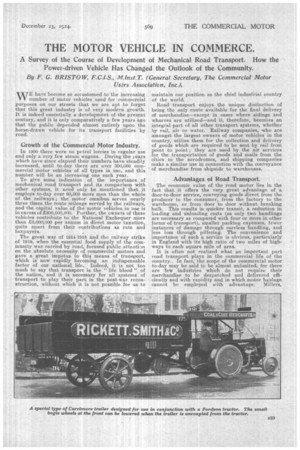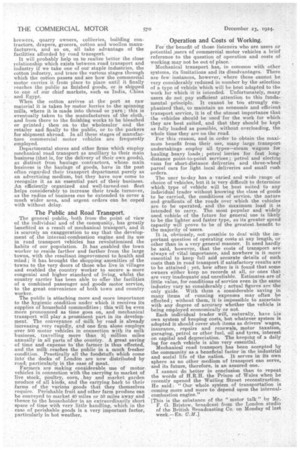THE MOTOR VEHICLE IN COMMERCE.
Page 13

Page 14

If you've noticed an error in this article please click here to report it so we can fix it.
A Survey of the Course of Development of Mechanical Road Transport How the Power-driven Vehicle Has Changed the Outlook of the Community.
By F. G. BRISTOW, Minst.T. (General Secretary, The Commercial Motor Uszrs Association, Inc.).
WE have become so accustomed to the increasing number of motor vehicles used for commercial purposes on our streets that we are apt to forget that this great industry is of very modern growth. It is indeed essentially, a development of the present century, and it is only comparatively a few years ago that the public depended almost entirely upon the horse-drawn vehicle for its transport facilities by road.
Growth of the Commercial Motor Industry.
In 1900 there were no petrol lorries in regular use and only a very few steam wagons. During the years which have since elapsed their numbers have steadily increased, until to-day there are over _300,000 commercial motor vehicles of all types in use, and this number will be an increasing one each year.
To give some indication of the importance of mechanical road transport and its comparison with other systems, it need only be mentioned that it employs to-day over 60,000 more men than the whole of therailways ; the motor omnibus serves nearly three times the route mileage served by the railways, and the capital value of the motor vehicles in use is in excess of 1200,000,000. Further, the owners of these vehicles contribute to the National Exchequer more than £6,000,000 per annum in direct motor taxation, quite apart from their contributions RS rate and taxpayers.
The great war of 1914-1918 and the railway strike of 1919, when the essential food supply of the community was carried by road, focused public attenti in on the absolute necessity of commercial motors and gave a great impetus to this means of transport, which is now rapidly becoming an indispensable factor of our national life. Indeed, it is not tea much to say that transport is the "life blood " of the nation, and it is necessary for all systems of transport to play their part in the post-war reconstruction, without which it is not possible for us to maintain our position as the chief industrial country of the world.
Road transport enjoys the unique distinction of being the only route available for the final delivery of merchandise—except in cases where sidings and wharves are utilized—and it, thetefore, becomes an integral part of all other transport systems, whether by rail, air or water. Railway companies, who are amongst the largest owners of motor vehicles in the country, utilize them for the collection and delivery of goods which are required to be sent by rail from point to point ; they are used by the air services for the transportation of goods and mails from the cities to the aerodromes, and shipping companiea make a similar use in connection with the conveyance ' of merchandise from shipside to warehouses.
. Advantages of Road Transport.
The economic value of the road motor lies in the fact that it offers the very, great advantage of a door-to-door service, conveying goods direct from the producer to the consumer' from the factory to the warehouse, or from door to door without breaking bulk. This results in quicker transit, a reduction in loading and unloading costs (as only two handlings are necessary as compared with four or more in other forms of transport), smaller packing expenses, fewer instances of damage through careless handling, and less loss through pilfering. The convenience and importance of such a service is obvious, particularly in England with its high ratio of two miles of highways to each square mile of area.
It is often not realized what an important part road transport plays in the commercial life of the country. In fact, the scope of the commercial motor to-day may be said to be almost unlimited, for there are few industries which do not require their merchandise to be despatched and delivered efficiently and with rapidity and in which motor haulage cannot be employed with advantage. Millers, brewers, quarry owners, collieries, building contractors, drapers, grocers, cotton and woollen manufacturers, and so on, all take advantage of the facilities afforded by road transport.
It will probably help us to realize better the close relationship which exists between road transport and industry if we take one of our staple industries, the cotton industry, and trace the various stages through which the cotton names and see how the commercial motor carries it from place to place until it finally reaches the public as finished goods, or is shipped to one of our chief markets, such as India, China and Egypt.
When the cotton arrives at the port as raw material it is taken by motor lorries to the spinning mills, where it is made into thread or yarn; this is eventually taken to the manufacturers of the cloth, and from there to the finishing works to be bleached or printed ; then on to the wholesaler and the retailer and finally to the public, or to the packers for shipment abroad. In all these stages of manufacture commercial motor vehicles are frequently employed.
Departmental stores and other firms which employ mechanical road transport as ancillaryto their main business (that is, for the delivery of their own goods), as distinct from haulage contractors, whose main business is the haulage of goods, have in the past often regarded their transport department purely as an advertising medium, but they have now come to recognize it as an essential part of their business. An efficiently organized and well-turned-out fleet helps considerably to increase their trade turnover, as the radius of business can be extended to cover a much wider area, and urgent orders can be coped with without delay.
The Public and Road Transport.
The general public, both from the point of view of the individual and of the community, has greatly benefited as a result of mechanical transport, and it is scarcely an exaggeration to say that the development of the internal-combustion engine and its use in road transport vehicles has revolutionized the habits of our population. It has enabled the town worker to reside farther and farther from the large towns, with the resultant improvement to health and mind ; it has brought the shopping amenities of the towns to the very doors of those who live in villages and enabled the country worker to secure amore congenial and higher standard of living, whilst the country carrier has been able to offer the facilities of a combined passenger and goods motor service, to the great convenience of both town and country worker.
The public is attaching more and more importance to the hygienic condition under which it receives its supplies of household commodities ; this will be even more pronounced as time goes on, and mechanical transport will play a prominent part in its development. The conveyance of milk by road is already increasing very rapidly, and one firm alone employs over 500 motor vehicles in connection with its milk business, travelling more than 31 million miles annually in all parts of the country. A great saving of time and expense to"the farmer is thus effected, and' the milk reaches the public in a much fresher condition. Practically all the foodstuffs which come into the docks of London are now distributed by road, particularly in the case of meat.
Farmers are making considerable use of motor. vehicles in connection with the carrying to market of live stock, poultry, corn, hay and market garden produce of all kinds, and the carrying back to their farms of the various goods that they themselves require. Perishable fruit and other farm produce can be conveyed to market 40 miles or 50 miles away and thence to the householder in an extraordinarily short space of time with very little handling, which in the case of perishable goods is a very important factor, particularly in hot weather.
Operation and Costs of Working.
For the-benefit of those listeners who are users or potential ;users of commercial motor vehicles a brief reference to the question of operation and costs of• working may not be out of place.
Mechanical transport has, in common with other systems, its limitations and its disadvantages. There are few instances, however, where these cannot be very considerably reduced in number by the selection of a type of vehicle 'which will be best adapted to the work for which it is intended. Unfortunately, many users do not pay sufficient attention to this fundamental principle. It cannot be too strongly em phasized that, to maintain an economic and efficient transport service, it is of the utmost importance that the vehicles should be used for the work for which they are best suited, and that they should be kept as fully loaded as possible, without overloading, the whole time they are on the road.
For this reason, and in order to obtain the maximum benefit from their use, many large transport undertakings employ all types—steam wagons for hauling heavy loads ; petrol lorries for fast longdistance point-to-point services ; petrol and electric vans for short-distance deliveries and three-wheel parcel cars for light local deliveries and small rush orders.
The user to-day has a varied and wide range of choice of vehicles, but it is very difficult to determine which type of vehicle will be best suited to any individual trader without knowing the class of goods to be carried, the conditions of service, the nature and gradients of the roads over which the vehicles are to be operated, and the maximum load it is intended to carry. The most popular and widely
used vehicle of the future for general use is likely to be the lighter and faster type, as its greater speed capacity will prove to be of the greatest benefit to the majority of users.
It is, obviously, not possible to deal with the important question of operating costs at any length, or other than in a very general manner. It need hardly be said, however, that the costs of transport are always of vital importance, and nowhere is it more essential to keep full aild accurate details of such costs than in road transport if satisfactory results are to be attained; yet, how often is it found that some owners either keep no records at all, or ones that are very inadequate and unreliable. Estimates are of little value, for conditions of service even in the same industry vary so considerably ; actual figures are the only guide. With them a considerable saving in many items of running expenses may often be effected ; without them, it is impossible to ascertain with any degree of accuracy whether the vehicle is being employed economically or not. Each individual trader will, naturally, have his own system of keeping costs, but whatever, system is adopted it should cover slich items as drivers' wages, insurance, repairs and renewals, motor taxation, garaging, petrol or other fuel, oil and tyres, interest on capital and depreciation. The keeping of a daily log for each vehicle is also very essential. Mechanical road transport has been accepted by the community as a beneficial factor in the industrial
and social life of the nation. It serves in its own sphere as no other medium of transport can serve, and its future, therefore, is an assured one.
I cannot do better in conclusion than to repeat the words of H.R.H. the Prince of Wales when he recently opened the Watling Street reconstruction. He said: Our whole system of transportation is coming more and more to depend upon the internalcombustion engine."
[This is the substance of the "motor talk" by Mr. F. G. Bristow, broadcast from the London studio of the British Broadcasting Co. on Monday of last week.—En. C.111.]
































